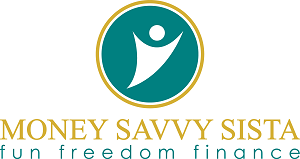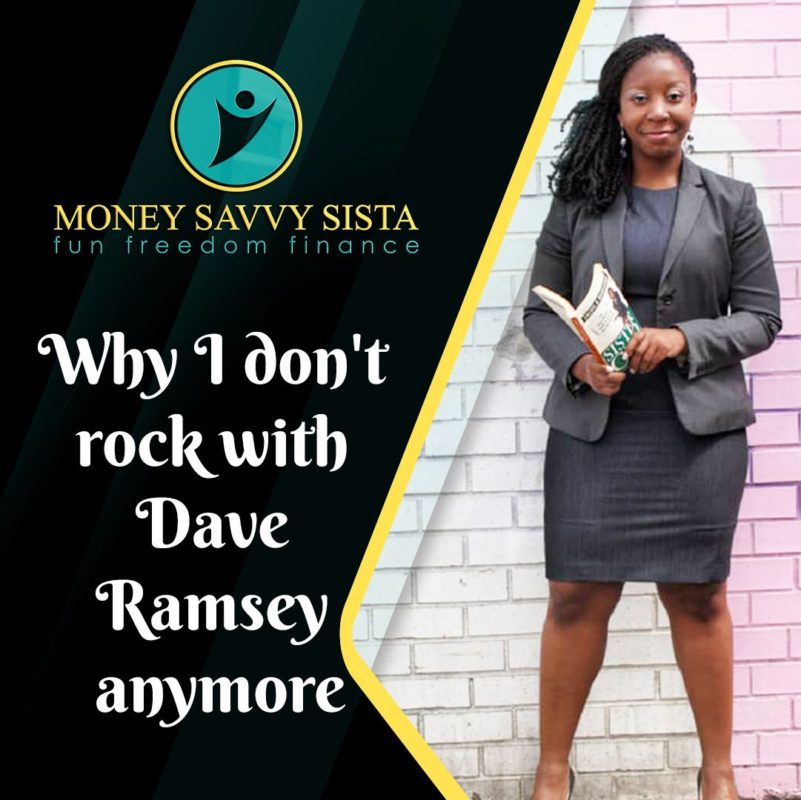PERSONAL FINANCE GURU
Why I don’t rock with Dave Ramsey Anymore
If you aren’t familiar with Dave Ramsey, he’s a personal finance guru who has authored several books, hosts a radio show, and teaches the course Financial Peace University (FPU). I was a big fan and used to give out his books for Christmas. But there came a point where his advice couldn’t take me to the next level of financial security or create my desired lifestyle by design. So, there are 5 major reasons I don’t rock with Dave Ramsey anymore.
Reason #1 He assumes we have no self-control and can’t use credit effectively
I use credit but I also have self-control. I had $10,000 in credit card debt at the time that I was unemployed and decided to join the Peace Corps. I paid for very basic necessities with credit while I lived with my parents. Then supplemented my life as a volunteer in the Amazon Rainforest in Bolivia for 2 years with credit. My salary was $200 a month and I used a portion of my Peace Corps readjustment money to pay the minimum on my students loans during that time. My total credit debt after finishing my Peace Corps Service was $20,000.
I was grateful for the ability to use credit cards. And my great credit score qualified me for 0% offers. If I didn’t have the cards I would have been at the mercy of borrowing from payday loans, begging my parents, and possibly staying at the dead-end jobs I had during the economic slowdown. Instead, I bet on myself and went to work overseas which made me more competitive when I returned.
I remember reading Total Money Makeover and it did inspire me to focus and pay off my credit card debt. But, I never cut up my credit cards. I’m not a perfect saver and I do splurge sometimes. But I knew I was not the audience targeted in the book that had no self-control. I wasn’t spending so much that the only solution was to cut up my cards and swear off credit forever.
What about you? Do you need to cut up your credit cards? How do you maintain control over your spending?
Reason #2 His teaching adds undue judgement and shame to debt
Judgement and Shame are not the best motivators. They encourage hiding, self-doubt, self-loathing, and make you overly critical of others. Yes, you are going to make some mistakes with money. However, education, mentorship, courage and creativity will aid you in turning those missteps around. Therefore, I dislike the adage that “the debtor is slave to the lender.” It must begin in the mind that YOU are not a slave to anyone. And you can decide to take the necessary actions to reduce your debt and change your life. Dave and his wife were over-leveraged in their real estate investments and lost everything. They filed for bankruptcy several years ago. But he had no shame in building a multi-million dollar business teaching money principles. I wonder if he borrowed any money along the way? He learned from his mistakes and figured out how to profit from them. You can too.
The adage is overly critical of the life circumstances that put individuals in debt like medical emergencies, divorce, and other disasters that can bankrupt a family. Those circumstances require more systematic change than just being disciplined with your spending on clothes. So we should drop the shame and judgement of being in debt. Only then can we address the underlying causes of the debt, which may be more complex than a simple character flaw.
I start all of my coaching sessions with the Money Savvy Intentions of no judgement, honesty, and courage. Accept that you may make mistakes and refrain from judging yourself. Be honest with yourself about your authentic desires. Believe you are a courageous, creative problem solver that can create a solution in any situation. These parameters are better motivators for great money management than judgement and shame.
What do you think? Am I being too sensitive and he’s providing a necessary kick in the pants? What has helped you with debt repayment and money management?
Reason #3 Debt known as leverage can be used responsibly to grow your income
When you are wealthy or a business owner, your debt is called leverage. And when you get into trouble with your investments or money management, it is because you are “over-leveraged.” However, the responsible use of debt or leverage can be a viable tool for growing your business.
Several years ago I became an Airbnb host to bring in extra money for savings, fun and travel. I didn’t really have a business saving account so I used one of my low interest rate credit cards to invest in setting up my Airbnb business. I purchased a new bed, dressers, towels, and wireless security locks for the doors to my basement. For that initial investment of $1,500 I was able to make about $5,000 each summer from DC tourists. If I had the belief that all debt is bad I would never have bet on myself and earned extra income.
Dave’s super conservative approach doesn’t teach about educated risks, use of debt and the possibility of higher rewards. I wanted to be a home owner and eventually a real estate investor. Both of those dreams were made possible with the conservative use of mortgage debt. Even with a high salary, I would not be able to buy a house with cash in DC or Baltimore. I almost didn’t buy a home in DC because I didn’t have $200k saved. But I was able to take advantage of new homeowner programs that qualified me for a mortgage based on my salary, expenses, and credit score. Five years later, I sold that home for a healthy profit. Now I am house hacking in Baltimore and my tenant pays 75% of my mortgage. I don’t mind debt at all, especially when someone else is paying it.
How do you feel about borrowing money to make money? Have you ever borrowed money to start a business or buy a home?
Reason #4 You can’t use cash for everything
You can’t use cash for everything. And Dave preaches that we should buy everything in cash. His reasoning is that debit and credit cards make it too easy for us to overspend and we would spend less if we used cash. So, his recommendation is to cut up all credit and debit cards.
Dave even insists that you can get a mortgage or rent a place without a credit score. But that is simply not true. There are very few mortgage officers or landlords that want to look through all of your banking accounts, utilities, and bill pay accounts to determine whether you are low risk and responsible with paying your bills. Your income indicates your ability to pay, but your credit score indicates whether or not you actually will. Without that indicator, you’re considered a higher risk. You can qualify for a mortgage with zero credit, but it is a lot more difficult and more expensive.
Using cash only is even more impossible now as we move to an almost cashless society with Uber, Amazon, Instacart, PayPal, Cash App, and Door Dash. As a woman living in a big city, I didn’t feel comfortable walking around with envelopes of cash. So, I identified the spending categories I wanted to control better and put them in a separate account with its own debit card.
What is your recommendation? Does using a cash only system help you control your spending? How often do you use cash?
Reason #5 There are no rewards for having credit cards
According to Dave, there are no rewards for having credit cards. But, credit cards help my travel addiction. My greatest joy is Travel hacking and I wish I knew about these strategies sooner.
If you are responsible with paying your credit card balance each month in full, you should take advantage of credit card rewards. Credit card companies are notorious for charging users with late fees, hiking up our interest rates with no warning, and ruining our credit scores. So why not make these same companies earn every penny of your business without paying high fees. If you pay your balance on time, you can earn miles and points for every dollar charged to your card. These miles and points can be used for airline tickets, hotel stays, car rentals, new computers, and gift cards.
To date I have used Amex and Chase points to buy new computers, gift cards at Christmas time, and business class seats to LA and Thailand. I now fly my family to see me every year so they are not exhausted from the drive from NC to MD. It’s a wonderful life to earn bonus travel and gifts based on money you were going to spend anyway.
So what are your credit success stories? What perks do you take advantage of as a result of your responsible use of credit?

